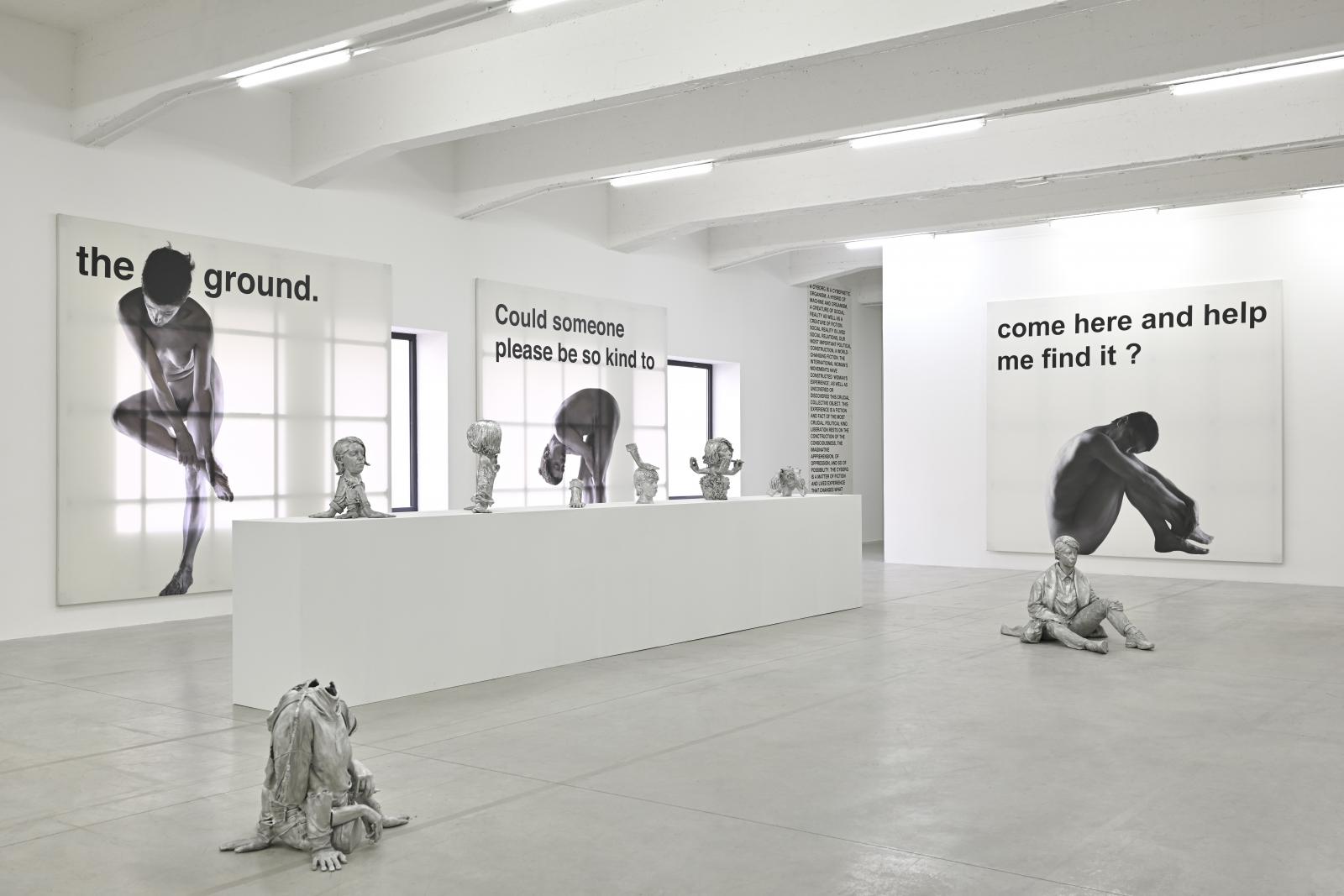Lili Reynaud-Dewar
"Je suis une chose publique"
Born in 1975 in La Rochelle.
Acknowledgements: Lodovico Corsini, Brussels; Emanuel Layr, Vienna; Galleri Opdahl and Stavanger Secession, Stavanger.
“I am a public thing”—a phrase borrowed from Victor Hugo1—celebrates the Consortium Museum’s recent acquisition of two works by Lili Reynaud Dewar.
The creation of the first, chronologically, Teeth, Gums, Machines, Future, Society (2016) was begun in 2009, and over time came to comprise a vast installation, combining video, performance, text, and sculpture. The work makes reference to the history of Memphis, to the riots related to the history of the city’s workers and their social conditions, as well as a specific object (a set of false teeth discovered in the 1980s) and a literal mention of Donna Haraway’s Cyborg Manifesto (1985)—a text in which the author posits the cyborg as a figure that surpasses questions of gender, race, and social class. The installation was initially presented at the Kunstverein in Hamburg in 2016.
Detailing the elements and sources of inspiration characterizing any given work by Lili Reynaud Dewar is always somewhat futile because her works do not necessarily entail any attempt at coherence or even transparency. The heterogeneous elements comprising Teeth, Gums, Machines, Future, Society should be considered as akin to the members of an orchestra brought together to play a score that introduces an atmosphere—one that allows for exploring sometimes contradictory feelings related to each individual’s own definition of a social or cultural emotion that arises while exploring the story. “My work does not feature a guiding principle, nor does it explore a specific theme, but rather it strives to introduce social and political issues into the field of aesthetics and cast light on the contradictions of such an endeavor,” she states.
The second, Oops, I think I may have lost my lighter somewhere on the ground… Could someone please be so kind to come here and help me find it? (2019) was initially created in response to an invitation from the Kunsthaus de Bregenz in 2018 to take part in the KUB Billboard Program, which featured original posters displayed along the busiest street in the city. Reynaud-Dewar “recycled” this public art project into private artworks, exhibiting the seven pieces again the following year at her New York gallery. Those seven disproportionately large panels showed her nude. Her body (always a subject and an instrument in Dewar’s work) was painted a single color and posed in various positions, while a sentence (the one in the title) unfolding above her spanned the seven elements. The typography used for the phrase clearly echoed the warning messages now found on every pack of cigarettes: the work projected the intimate into public space through an obviously banal message that was “blown out of proportion,” much like the mechanisms of social media. “I dance, I speak, I write, I teach, I make objects, furniture, video installations, films, feminist magazines, alone or with my friends, my students, my family,” says Reynaud Dewar, who is especially interested in “the history of racial and sexual freedom, the circulation and interpretation of works, biographical motifs in cultural production, and the shifting figure of the artist in a globalized world.”
“I am a public thing” features, in addition to these two works, a body of recent cast aluminum sculptures, in which the artist’s body is absurdly reconfigured, as well as a series of photographs that relate to the works being cast at the foundry where Reynaud once again appears naked, her body painted. She has been taking dance classes since childhood (she studied classical dance at the Conservatoire de La Rochelle) and has danced in around fifty venues since 2011, when she began recording those sessions in which she dances, her body painted a single color (red, green, black, silver, etc.), in exhibitions or cultural spaces in cities such as Okayama, Venice, New York, Marfa, and others. Since 2011, she has created 49 film works, most of which are presented in the screening room at the Consortium Museum—including the most recent previously unseen film produced for the exhibition, in which Reynaud Dewar is dancing in the Andreas Schulze exhibition at the Consortium Museum.[2]
“I am a public thing” also resonates with her recently installed sculpture in Besançon’s Place de la Révolution, a commission Lili Reynaud Dewar received to commemorate Jenny d’Héricourt, a nineteenth-century women’s rights activist from Besançon who wrote The Emancipated Woman in 1860. Jenny d’Héricourt was ideologically aligned with Pierre-Joseph Proudhon—the theorist of libertarian socialism—who, like her, was born in Besançon the same year and played a major role, as she did, in the 1848 revolution.
— Éric Troncy
—
1. The title is borrowed from a Victor Hugo text: “They have given up asking my authorization to recite my works which are being recited everywhere without my permission. They are right. What I write is not my own. I am a public thing.” November 27, 1870.
2. Andreas Schulze, curated by Eric Troncy, Consortium Museum, May 16-November 2, 2025.












